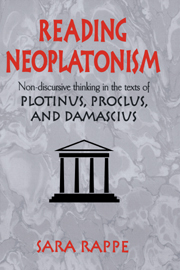Book contents
- Frontmatter
- Contents
- Preface: Discursive Strategies and Neoplatonic Texts
- Acknowledgments
- List of Abbreviations
- 1 Introduction. Representing a Tradition: Exegesis, Symbol, and Self-reflection
- PART I LANGUAGE IN THE ENNEADS
- PART TWO TEXT AND TRADITION IN NEOPLATONISM
- 6 History of an Enigma: Mathematical Symbolism in the Neoplatonic Tradition
- 7 Transmigrations of a Myth: Orphic Texts and Platonic Contexts
- 8 Language and Theurgy in Proclus' Platonic Theology
- 9 Damascius' Ineffable Discourse
- 10 Conclusion: Reading Neoplatonism
- References
- General Index
- Index Locorum
7 - Transmigrations of a Myth: Orphic Texts and Platonic Contexts
Published online by Cambridge University Press: 24 October 2009
- Frontmatter
- Contents
- Preface: Discursive Strategies and Neoplatonic Texts
- Acknowledgments
- List of Abbreviations
- 1 Introduction. Representing a Tradition: Exegesis, Symbol, and Self-reflection
- PART I LANGUAGE IN THE ENNEADS
- PART TWO TEXT AND TRADITION IN NEOPLATONISM
- 6 History of an Enigma: Mathematical Symbolism in the Neoplatonic Tradition
- 7 Transmigrations of a Myth: Orphic Texts and Platonic Contexts
- 8 Language and Theurgy in Proclus' Platonic Theology
- 9 Damascius' Ineffable Discourse
- 10 Conclusion: Reading Neoplatonism
- References
- General Index
- Index Locorum
Summary
In this chapter I survey allusions to the Orphic cosmology in the works of Plato and of subsequent Platonizing authors. My theme in this chapter is to look once more at a group of symbols accorded particular status among Neoplatonic authors. As in the previous chapter, I start from the text of Plato and work forward in history. In all likelihood, the central Orphic myth implied the ritual death, dismemberment, and reconstitution of the initiate. Plato makes use of this ritual motif to underscore his analysis of selfhood and self-transcendence. Later in the tradition, the initiatory associations with Orphic symbolism are appropriated to authorize supposedly esoteric interpretations of Plato's dialogues. Orpheus, from the enchanted visionary of the earlier tradition, becomes a metaphysically astute theologian for the later Neoplatonists.
Throughout its transmigrations over the centuries, one particular episode in this myth, the rending of Dionysus, enjoys perhaps the greatest celebrity or notoriety. This episode has clear ritual associations, as the initiated candidate and the suffering god undergo parallel experiences in different zones, so to speak. The mythohistory of the cosmos revealed in the Orphic theology contains as its final episode an etiology for specifically human consciousness, in the rending of Dionysus at the hands of the Titans. The physical details of the myth, with its elements of androgynous self-impregnation, solipsistic world swallowing, transgression, rebellion, and finally sexual sparagmos – collapse of the androgynous self into a gendered being – provide all the necessary elements for a psychoanalytic reading.
- Type
- Chapter
- Information
- Reading NeoplatonismNon-discursive Thinking in the Texts of Plotinus, Proclus, and Damascius, pp. 143 - 166Publisher: Cambridge University PressPrint publication year: 2000



